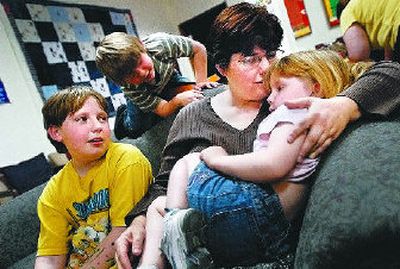What works: YWCA program offers safe space, help

A year ago, the 39-year-old mom and her six children arrived at Spokane’s YWCA domestic violence shelter with nothing more than a few suitcases of clothing.
“I grabbed three little Lego princess figures for my 3-year-old,” recalled the woman now known as Linda Baker. “That’s what she had for toys.”
Everything else was sacrificed to escape her husband, whose years of violence finally threatened to spill onto the kids.
“There were a lot of guns,” said Baker, who has changed her name twice to keep him from finding her.
“I was afraid the day I left that there wouldn’t be any of me left to leave.”
The confidential shelter run by the YWCA’s Alternatives to Domestic Violence Programs was Baker’s fourth stop after fleeing her California home in February 2006, she said.
Nowhere else had the space, resources or, frankly, patience for a homeless family of seven. But at the Spokane agency that last year housed nearly 760 domestic violence victims and helped more than 7,000 more, Baker found the foothold for a new life.
Today, Baker is working as a secretary for Spokane County, thanks to job training and encouragement from the YWCA. Her family lives in a bright new apartment provided through the agency’s transitional housing program. Her children, who range from 2-year-old Sam to 16-year-old Caitlin, are securely enrolled in day care and school – and in community counseling programs to help unravel the trauma of life with their dad.
While the children weren’t physically harmed, they watched their dad hurt their mom – and they heard him threaten to kill her, Baker said.
Like many children who live in violent homes, theysuffer from lingering reactions that psychologists have defined as post-traumatic stress disorder or, more recently, complex trauma disorder.
“Andrew had terrible nightmares,” Baker said, nodding toward her sturdy 7-year-old. “One day after we got here, he just had a meltdown. It took four adults to hold him down.”
Slowly, though, everyone is getting better. Ailish, a blond preschooler in a pink T-shirt, holds up four fingers when a visitor asks her age. A year ago, she would have been too scared to interact with a stranger.
“All the kids, they’re not as quiet now, but they’re not as skittish,” said Caitlin, the oldest.
The difference has been the services of the YWCA program that provided far more than shelter, Baker said.
“It gave us the stability,” she said. “When you first leave, it’s like fight-or-flight, but then you stop and think, ‘Now what do I do?’ ”
With an annual budget of about $1.2 million, the Alternatives to Domestic Violence Program consumes about half of the YWCA’s total operating expenses of $2.3 million, federal tax records showed. The program, one of about 60 in Washington, is aimed at providing both short- and long-term services for domestic violence victims.
Services began in Spokane in the 1970s; the shelter started a decade ago, said Director Patty Wheeler.
Today, the program offers legal and financial assistance, and a broad range of classes to help clients – mostly women like Linda Baker – find a way out of abuse.
“At first, I didn’t see how it was going to happen,” Baker said. “But if you reach out, there are so many people on the other side who want to help.”